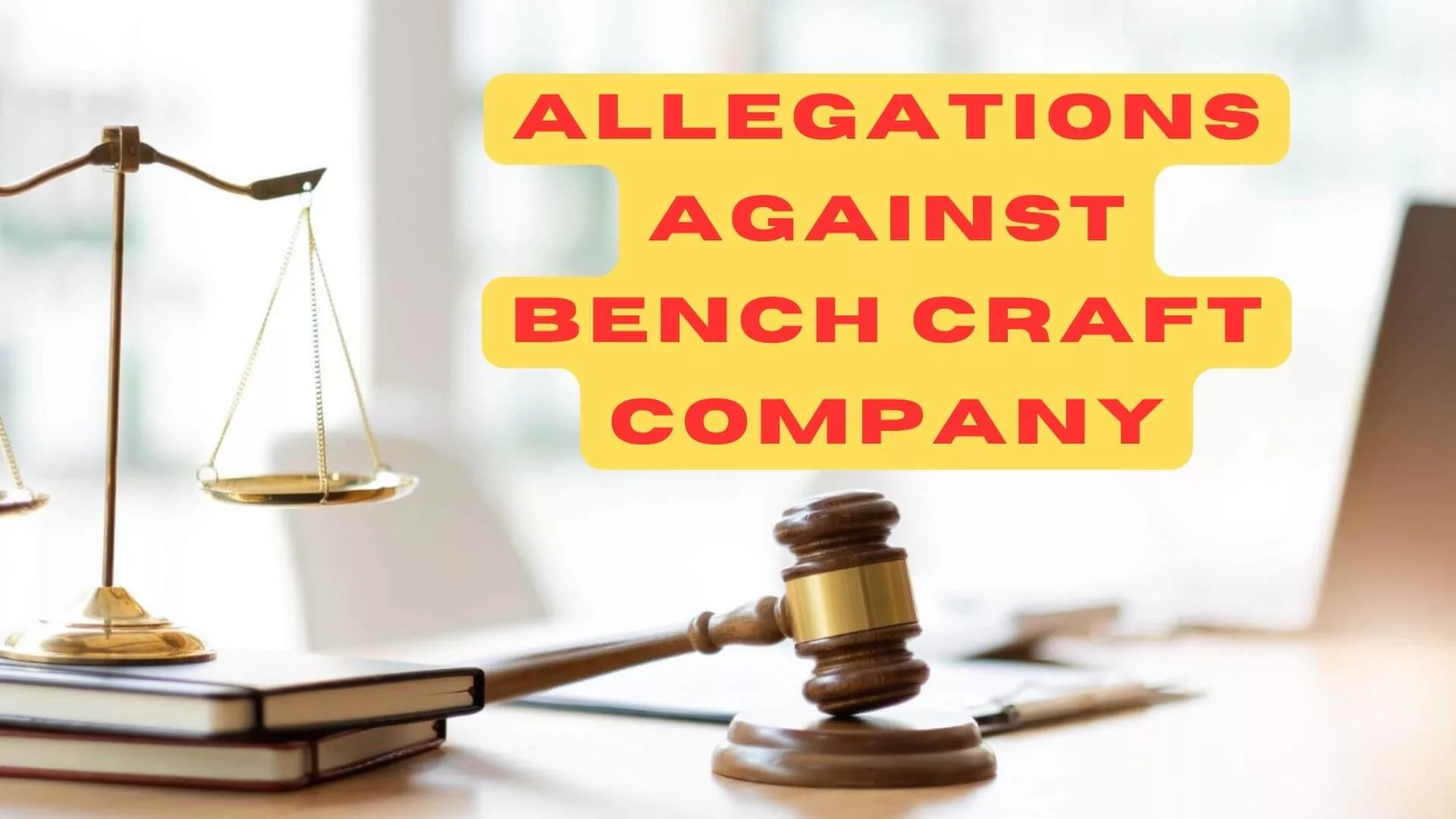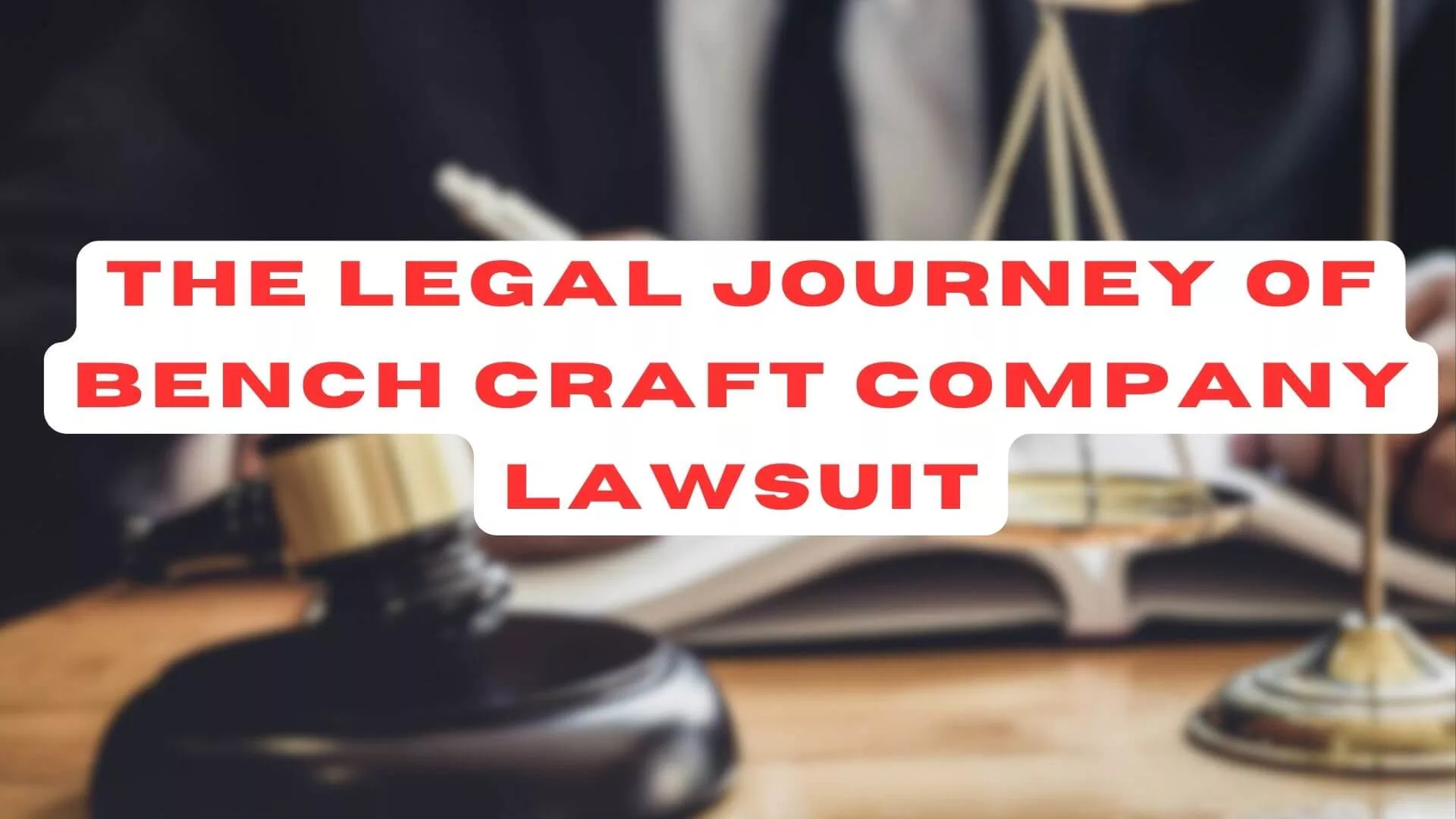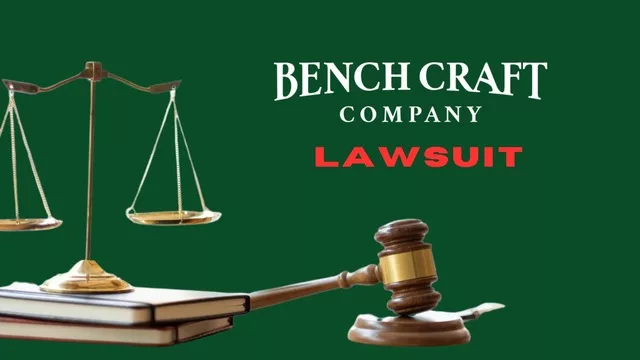The Bench Craft Company lawsuit has sparked discussions about business ethics, contract law, and corporate responsibility in the marketing and advertising industry. This lawsuit has gained significant attention as it is a class-action case against Bench Craft Company, which is a marketing firm based in Oregon, and focuses on allegations of deceptive practices and contract breaches. In this article, we’ll explore these allegations, the legal process, and the broader impacts of this lawsuit.
The allegations against the company are multifaceted, encompassing claims of deceptive practices and breaches of contract. These allegations are not only significant for the parties involved but also serve as a focal point for examining key issues within the business world. By doing so, we hope to provide a comprehensive understanding of the complexities and consequences associated with this lawsuit.
A History of Bench Craft Company
Bench Craft Company’s journey began in 1982, when a small group of dedicated professionals embarked on a unique venture. Today, with over 40 years of experience, we stand as a formidable partner to more than 4,000 golf courses across North America, annually producing over 72,000 advertisements.

Fast forward to the present, and Bench Craft Company has transformed into a global brand, boasting a workforce of over 400 employees. Their corporate headquarters proudly reside in Portland, Oregon, with 12 regional offices strategically located throughout the United States and Canada.
What are the Allegations against Bench Craft Company?

At the core of the Bench Craft Company lawsuit, we find a complex web of allegations presented by the plaintiffs. These claims assert that they have experienced significant financial losses and emotional distress as a result of their interactions with the company.
These allegations form the very foundation of the legal battle and are far from insignificant; they carry substantial weight and cast a revealing spotlight on several critical facets of business conduct.
First and foremost, the plaintiffs’ claims of financial losses underscore the profound impact that business transactions can have on the economic well-being of individuals and entities. It serves as a stark reminder that in the world of commerce, financial outcomes are not just numbers on a balance sheet but can have real and tangible consequences for those involved.
1. Deceptive Marketing Practices
One of the other central allegations revolves around deceptive marketing practices. Plaintiffs argue that Bench Craft Company misrepresented its advertising services, particularly the reach and impact of their campaigns. This misrepresentation is not unique to Bench Craft but is a challenge faced by the broader marketing and advertising industry like creating sales funnel.
Real-Life Example
The Federal Trade Commission (FTC) has filed charges against Volkswagen Group of America, Inc., alleging deceptive practices in their advertising campaign promoting “clean diesel” VWs and Audis. Volkswagen had equipped these vehicles with illegal emission defeat devices, which were designed to conceal high emissions during official government tests.
The FTC is pursuing legal action to secure a court order that would require Volkswagen to provide compensation to American consumers who purchased or leased affected vehicles between late 2008 and late 2015. Additionally, they seek an injunction to prevent Volkswagen from engaging in similar misconduct in the future.
2. Unfair Contract Terms

In addition to deceptive marketing practices, the lawsuit includes allegations of unfair contract terms. Plaintiffs claim that Bench Craft Company imposed unfavorable conditions within their contracts. Thus, potentially violating laws governing fair contract terms.
Real-Life Example
The Federal Trade Commission (FTC) has given approval for the initiation of an administrative complaint concerning the proposed merger involving Microsoft Corp. and Activision Blizzard, Inc.
Activision Blizzard is known for its creation and publication of popular video games such as Call of Duty, World of Warcraft, Diablo, and Overwatch. Microsoft.
On the other hand, is involved in the sale of Xbox gaming consoles and provides services like Xbox Game Pass, a video game subscription service, and a cloud-based video game streaming service.
The FTC alleges that this merger could potentially grant Microsoft the ability to stifle competition within the gaming industry. Specifically in relation to its Xbox gaming consoles and the rapidly expanding subscription and cloud gaming sector
3. Breach of Contract
Another pillar of the allegations against Bench Craft Company is the breach of contract claims. Plaintiffs assert that the company failed to deliver promised results outlined in their advertising contracts, leading to financial losses.
Real-Life Example
One of the most famous cases involving a “breach of contract” dispute is commonly known as the “Pepsi Points Case.” This legal episode began when Pepsi aired a lighthearted commercial in which they humorously claimed that 7,000,000 Pepsi points could be exchanged for an AV-8 Harrier II jump jet.
Intrigued by the prospect of acquiring a Harrier jet, a 21-year-old business student took the commercial at face value. Sending Pepsi a check for $700,000, which was in accordance with the contest rules, in an attempt to secure the jet. Pepsi, however, returned the check, clarifying that the commercial was intended as a joke.
The Legal Journey of Bench Craft Company Lawsuit

The Bench Craft Company lawsuit has followed a legal journey that includes several phases, each with its own significance in determining the outcome and implications of the case.
1. Class-Action Status and Unity
Plaintiffs in the Bench Craft Company lawsuit united under a class-action lawsuit. This legal strategy allowed them to pool resources and legal efforts, presenting a stronger challenge to the company’s alleged misconduct.
Real-Life Example
The infamous Volkswagen Dieselgate scandal is a classic example of a class-action lawsuit. Thousands of affected car owners joined forces in a lawsuit against the automaker for deceptive emissions practices.
2. Discovery and Injunction Phase
During the discovery phase, both parties exchanged evidence and expert witnesses. Plaintiffs aimed to substantiate their claims, while Bench Craft Company mounted its defense. An injunction was sought to halt the company’s operations temporarily, a critical stage in shaping the lawsuit’s course.
Real-Life Example
GlaxoSmithKline LLC (GSK), a major player in the global healthcare industry, has entered into a guilty plea agreement and will pay $3 billion to address its legal responsibilities stemming from unlawful marketing of specific prescription medications, failure to report essential safety information, and allegations of false price reporting practices.
This landmark resolution, announced by the Justice Department, marks the largest settlement for healthcare fraud in U.S. history and represents the highest financial penalty ever imposed on a pharmaceutical company.
What are the Implications of Doing Corrupt Practices?

As the legal battle progressed, both parties engaged in settlement negotiations, exploring the possibility of resolving the dispute outside the courtroom. However, the lawsuit ultimately proceeded to a final verdict, which established legal precedent.
The implications of engaging in corrupt practices, as highlighted by the Bench Craft Company lawsuit. Ripple far beyond the immediate parties involved and cast a long shadow over the marketing and advertising industry.
1. Financial and Emotional Impact
The Bench Craft Company lawsuit, like many cases involving deceptive practices, exacted a considerable toll on the plaintiffs. They suffered substantial financial losses, which not only affected their bottom line but also raised questions about the reliability of the businesses they had trusted.
Real-Life Example
The Enron scandal serves as a stark reminder of the dire consequences of corporate misconduct. Employees and investors faced devastating financial losses when the energy giant filed for bankruptcy. This infamous case spotlighted the real and lasting impact that corrupt practices can have on stakeholders.
2. Changes in Business Practices

In response to the lawsuit, businesses within the marketing and advertising industry underwent a significant transformation in their practices. Transparency, fair contract terms, and accountability became focal points as they sought to avoid similar controversies.
Real-Life Example
The Equifax data breach sent shockwaves through various industries. Companies across the board intensified their efforts to bolster data security practices and enhance transparency to safeguard customer information.
This incident illustrated the importance of proactively addressing vulnerabilities and the need for stringent data protection measures.
3. Industry Perspective
The outcomes of the Bench Craft Company lawsuit reverberated throughout the marketing and advertising sector. They compelled other businesses in the industry to reconsider their modus operandi. Ethical practices, transparency, and the faithful delivery of promised services to clients became paramount concerns.
Real-Life Example
The Cambridge Analytica scandal had a profound impact on social media platforms. It prompted a thorough reevaluation of their data handling practices and privacy policies.
The aftermath of this scandal demonstrated the urgency of rebuilding user trust and maintaining the highest ethical standards.
The implications of engaging in corrupt practices, as demonstrated by the Bench Craft Company lawsuit, extend well beyond the courtroom. They touch the lives of individuals, shape the business landscape, and influence entire industries.
These implications serve as cautionary tales, emphasizing the critical importance of ethical conduct, transparency, and accountability in today’s corporate world.
Conclusion
The Bench Craft Company lawsuit serves as a significant case study, shedding light on critical issues in the marketing and advertising industry. It underscores the importance of ethical conduct, transparent business practices, and the consequences of deceptive marketing and unfair contract terms.
This lawsuit serves as a reminder that businesses must uphold the highest standards of ethics and transparency in their operations. Deceptive practices and unfair contract terms can not only lead to legal consequences but also tarnish a company’s reputation and erode customer trust and feedback.
It is imperative that organizations prioritize ethical conduct, maintain transparency, and fulfill their promises to clients and customers. By doing so, they not only safeguard their own interests but also contribute to a more trustworthy and responsible business environment.
In the wake of cases like the Bench Craft Company lawsuit, the message is clear: integrity is the foundation upon which lasting success is built, and ethical practices are the compass that guides businesses toward a brighter and more sustainable future.

